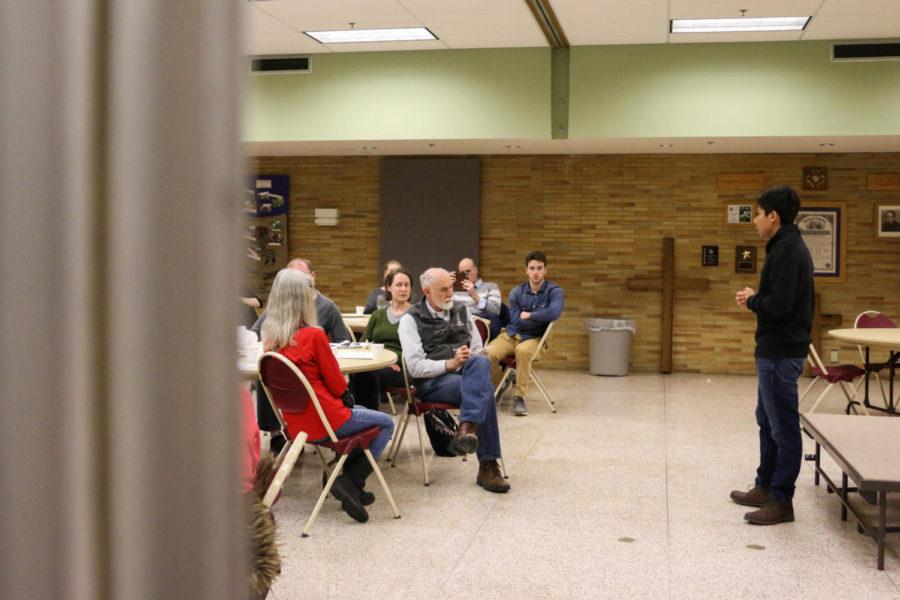Community gathers in support of DACA recipients
February 25, 2018
“We want to remind you this isn’t just political. We aren’t here as Republicans or Democrats, we’re here as Christians,” said Parishioner Karen Stein, the lead organizer of the event.
Thousands of immigrants may be at risk of deportation after March 5, the deadline set by President Trump for the Deferred Action For Childhood Arrivals, DACA, program to end.
DACA is a program put in place in 2012. It allows undocumented immigrants who entered the United States younger than 16 to legally work and attain documents such as driver’s licenses.
About 50 students and community members risked the icy roads to gather in the basement of Saint Thomas Aquinas Catholic Church to hear the stories of three DACA recipients and ask them questions.
The three DACA recipients are students at Iowa State, and requested their last names be omitted from this story due to the sensitive nature.
“DACA changed my life,” said Nicolas, who immediately began working two jobs after qualifying for DACA. “It assured me I could be here for my family no matter what, and that allowed me to go to college.”
Nicolas came to the United States when he was 3 years old. If the March 5 deadline passes with no decisions being made, Nicolas and thousands of other students and workers may be deported once their DACA status expires.
“I’m very determined,” Nicolas said. “I want this education, and if it comes to it, I’ll keep working until I get taken away.”
The DACA dinner was organized by three churches: Saint Cecilia’s, Saints Peter and Paul and Saint Thomas Aquinas. All of them pooled their resources for the event, and DACA recipients weren’t the only people invited.
Parishioners from the affiliated churches invited local and state representatives, and even Attorney General Tom Miller.
“Due to conflicts nobody could make it,” Stein said.
Stein immigrated to the U.S. from Nicaragua when she was 10 years old and is now a U.S. citizen. She works with Saint Cecilia’s Hispanic Ministry in Ames.
“I’ve met children in kindergarten who walk to school with their passports in their pockets in case something happens to their parents,” Stein said. “No child should have to carry that kind of weight on their shoulders.”
Although no representatives attended the dinner, Democratic Candidate for Iowa Congress J.D. Scholten came to hear what the DACA students shared. Scholten will be running against Rep. Steve King in the upcoming election.
“When you come from a compassionate Christian background you want to help,” Scholten said. “It’s frustrating that even with so much bipartisan support in Washington [D.C.], DACA recipients are at such a risk.
“I don’t know if [DACA recipients] will be here come election day, and that’s scary.”
Many DACA recipients lived in poverty, and the DACA program gave them a way to financially support themselves or their families. While DACA recipients pay taxes just like any American citizen, they do not qualify for Social Security aid.
“I vividly remember being pushed under the seat of a car and then being driven through customs,” said Alan, another DACA recipient studying at Iowa State. “Without DACA, I couldn’t work. I couldn’t apply for an unpaid internship, and when it’s gone all I’ll be able to do is write to people in Congress and hope they make some change.”
Many DACA recipients spent a vast majority of their lives in the U.S. and think of this country as their home. In fact, some were actually surprised to learn they aren’t legal citizens, and didn’t find out until they were teenagers.
“I remember my father always shied away from the topic when I asked him if I could get a job,” Alan said. “It was the same thing when it came to driving. I don’t think he wanted me to know.”
Andrea, the third DACA student who spoke at the dinner, remembered a similar experience.
“I was in high school and everyone was starting to get their driver permits,” Andrea said. “I just wouldn’t talk about it, because if people started asking too many questions who knows what would happen.”
The DACA program came along soon after Andrea began seeking her driver’s permit, and she immediately found a job and started working to get her license.
“DACA does more than help just me,” Andrea explained. “I help support my family, I pay taxes. Without DACA I can’t work to pay my rent, and I can’t go to school.”
Once the March 5 deadline falls, no DACA recipient will be able to renew their DACA status. If they’re lucky, they might have another two years before it expires. After that, they’re eligible for deportation.
“A lot of people won’t even be sent back to their home country,” Andrea said. “They’ll just be sent to Mexico, and it will be Mexico’s job to deport them again to El Salvador or Honduras, or wherever they happened to be born.”
Many people in the audience were shocked or saddened by this grim news.
“I come from a privileged home, so it’s powerful to see that people can just be torn from their families,” said Kelley Vassar, senior animal science.
Katie Hamilton, senior in biology, agreed.
“It’s easy to forget that this issue is so widespread,” Hamilton said. “Look around, it’s here. It’s at ISU.”
















